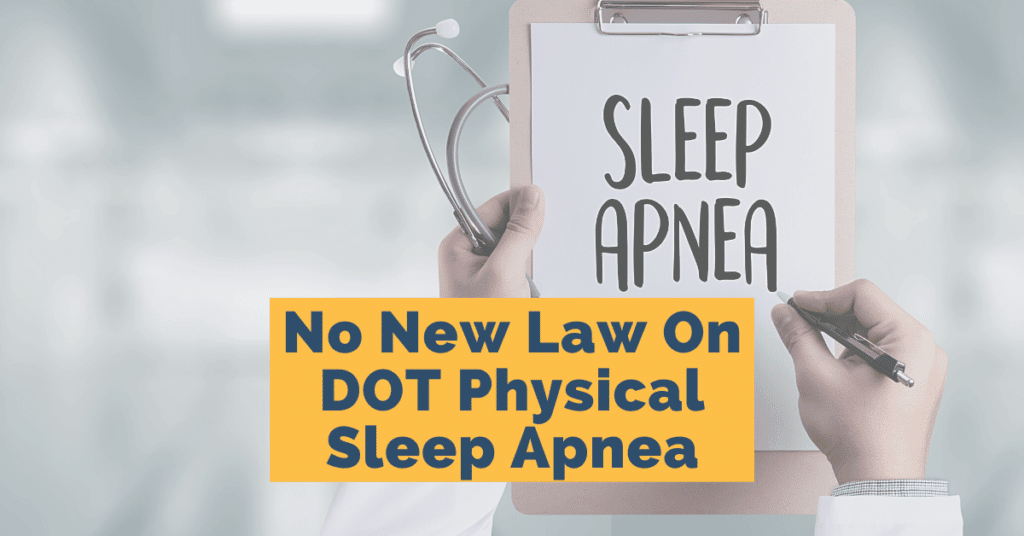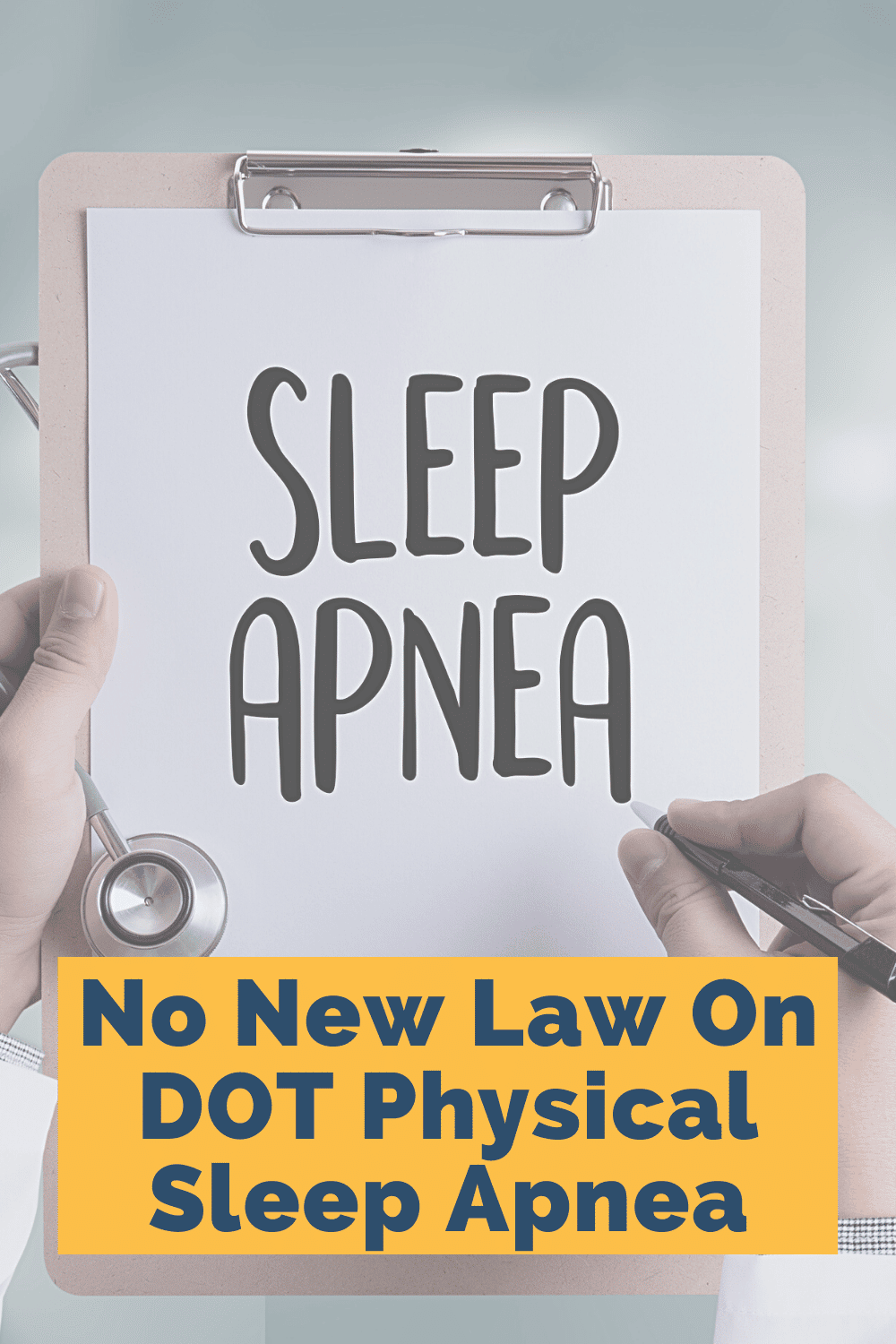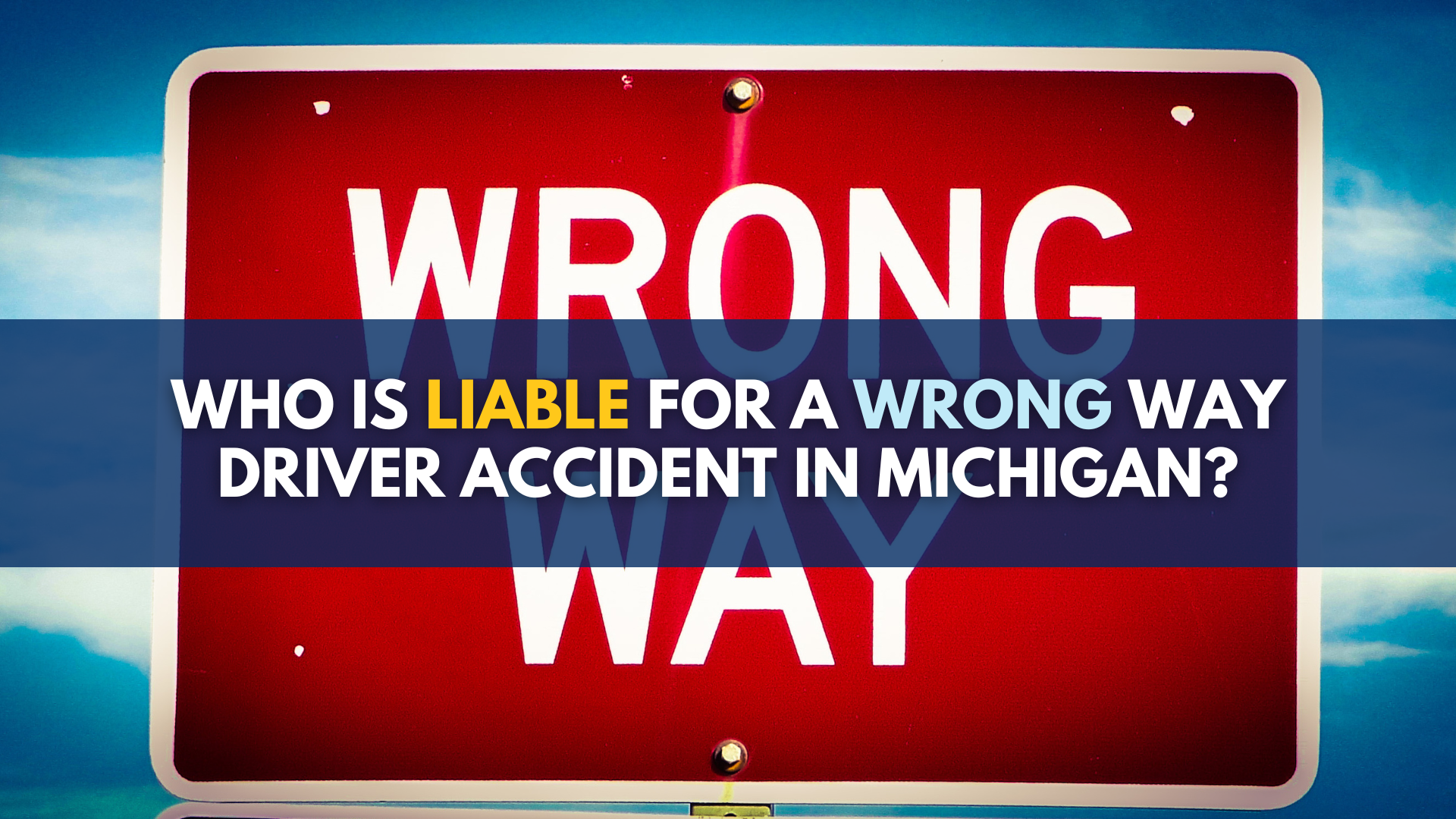
Despite the dangers for truck drivers and for the driving public, the U.S. Department of Transportation’s Federal Motor Carrier Safety Administration has decided not to issue a new law on DOT physical sleep apnea. Fatigue and drowsy driving remain serous safety concerns for truck drivers.
What does it mean that there is no new DOT physical sleep apnea law?
The fact that there is no new, old, or existing law on DOT physical sleep apnea means that the Federal Motor Carrier Safety Administration (FMCSA) has not specified how to tackle the serious safety issues posed by this disorder, specifically, how it can affect a truck driver’s driving ability, decision making behind the wheel, and health and safety qualifications to drive a large commercial vehicle.
It also means that the FMCSA has not specified how medical examiners should screen truck drivers for this disorder and what treatment is required to bring truckers into compliance with the FMCSA’s “physical qualifications” rules.
Why do people think there is a new DOT physical sleep apnea law?
In 2016, because so many truck drivers suffer from sleep apnea, the FMCSA proposed creating a rule that would require truckers with this disorder to get evaluated and undergo treatment with a sleep disorder expert. There is still a widespread belief that the 2016 proposed safety regulation took effect. However, in 2017, the FMSCA reversed course and withdrew its proposed rule regarding the necessity of a DOT physical sleep apnea law to rule out this disorder.
What could a new DOT physical sleep apnea law accomplish?
A new law requiring a DOT physical for sleep apnea for truck drivers would protect both truckers and all of the other drivers who share the road with big trucks.
Sleep apnea is a respiratory disorder that disrupts sufferers’ sleep by causing them to stop breathing while they are sleeping. This leaves truckers who suffer from this disorder fatigued and consequently makes them more likely to cause a truck accident if they are driving drowsy and impaired by disrupted sleep.
Here is what the FMCSA has said about the dangers posed by truckers suffering from this untreated disorder:
- “[S]tudies show that people with untreated sleep apnea have an increased risk of being involved in a fatigue-related motor vehicle crash.” (2014)
- Obstructive sleep apnea (OSA) “may culminate in unpredictable and sudden incapacitation (e.g., falling asleep at the wheel), thus contributing to the potential for crashes, injuries, and fatalities. . . . OSA raises health and safety concerns beyond those of other sleep disorders. Near-term increases in fatigue and cognitive dysfunction can result. Also, there are long-term adverse health effects such as dramatically increased risk for hypertension, heart disease, stroke, diabetes, and obesity.” (2015)
- Because of this medical condition interrupts and disrupts sleep, “eight hours of sleep [for a person with OSA] can be less refreshing than four hours of ordinary, uninterrupted sleep, posing serious cognitive and neuropsychological risks. Moreover, someone without enough restorative sleep is often unaware of impairments to a range of cognitive abilities such as vigilance, reaction time, attention span, memory, learning, problem-solving, decision making, and multi-tasking. OSA can also lead to mood swings and difficulty controlling inappropriate feelings.” (2015)
How prevalent is this disorder among truck drivers?
Nearly one-third of U.S. truckers are estimated to suffer from this disorder. Not surprisingly, given the disrupting effect that this disorder has on truckers’ sleep, driver sleepiness and fatigue is the cause of nearly 30% of truck accidents across the country every year.
What safety regulations could be relevant to sleep apnea in truckers?
Unfortunately, the laws and safety regulations issued by the DOT’s FMCSA do not specifically address sleep apnea and/or how it might affect a truck driver’s physical qualifications for being able to legally driver a commercial vehicle.
However, given that this disorder interferes with a person’s breathing, the FMCSA’s “physical qualifications for drivers” are often mentioned in discussions about how safety regulations may apply to sleep apnea:
- “A person . . . must not operate a commercial motor vehicle unless he or she is medically certified as physically qualified to do so . . .” (49 CFR § 391.41(a)(1))
- “A person is physically qualified to drive a commercial motor vehicle if that person . . . [h]as no established medical history or clinical diagnosis of a respiratory dysfunction likely to interfere with his/her ability to control and drive a commercial motor vehicle safely.” (49 CFR CFR § 391.41(b)(5))
With no new DOT physical sleep apnea law, what is the FMCSA doing to promote safety?
In a 2015 Bulletin on “Driver Safety & Health-Medical Requirements,” the FMCSA explained that under 49 CFR CFR § 391.41(b)(5) obstructive sleep apnea “is considered a respiratory dysfunction” that “interferes with oxygen exchange . . . when there is a determination that it is likely to interfere with the driver’s ability to operate safely because of the severity of the case.”
The FMCSA’s 2015 Bulletin also recommended that if the “medical examiner” who conducts a truck driver’s physical examination for his or her CDL (commercial driver’s license) “detects a respiratory dysfunction, that in any way is likely to interfere with the driver’s ability to safely control and drive a commercial motor vehicle, the driver must be referred to a specialist for further evaluation and therapy.”
However, as the FMCSA acknowledged in a 2016 notice of proposed rule-making, that guidance “is not helpful if the ME [medical examiner] does not have sufficient experience or information to suspect the driver may have OSA, or the driver does not share with the examiner any previous diagnosis that he has the condition.”
With no new DOT physical sleep apnea law, can a truck driver with this disorder continue to drive?
According to the current DOT physical sleep apnea law, the FMCSA states that the “disqualifying level of sleep apnea [for truck drivers] is moderate to severe, which interferes with safe driving.” A trucker with this disorder “should contact the medical qualifying examiner” to determine his or her “fitness to operate a commercial motor vehicle and to get help with treatment.”
The FMCSA also notes that “once successfully treated, a driver [with sleep apnea] may regain [his or her] ‘medically-qualified-to-drive’ status.”
Need help finding the right lawyer? Call Michigan Auto Law first
If you have been injured or lost a loved one in a truck accident caused by a truck, semi truck, tractor-trailer or commercial motor vehicle and would like to speak with an experienced truck accident attorney, call toll free anytime 24/7 at (800) 968-1001 for a free consultation with one of our attorneys. You can also get help from an experienced accident attorney by visiting our contact page or you can use the chat feature on our website.
(Sources: “How sleep apnea causes trucking accidents?,” FreightWaves, by Dean Croke, Chief Analytics Officer, January 2, 2020; FMCSA, Proposed Sleep Apnea Rule, March 10, 2016 notice; FMCSA, Proposed Sleep Apnea Rule, August 8, 2017 notice; FMCSA “Bulletin to Medical Examiners and Training Organizations Regarding Obstructive Sleep Apnea” (January 22, 2015); FMCSA, “Driving When You Have Sleep Apnea,” website page (February 19, 2014))




I have been diagnosed with SEVER SLEEP APNEA.
But the DOT PHYSICAL FROM BEAUMONT URGENT CARE states that I am capable of working. I was issued a 3 month DOT QUALIFICATIONS PHYSICAL. MY EMPLOYER WILL NOT LET ME WORK BECAUSE I HAVE SEVER SLEEP APNEA.
I NEED SOME HELP UNDERSTANDING THIS CONFLICT.